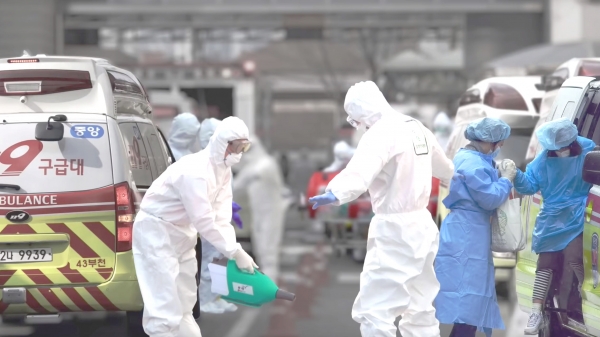
It has been approximately six months since China’s first report of COVID-19 (Dec. 31, 2019) and three months since the WHO’s declaration of COVID-19 as a pandemic (March 11, 2020). The world has faced until now 6,161,931 confirmed cases and 371,023 death. Many countries were forced to impose lockdowns and social distancing measures to prevent further spread of the pandemic. However, the virus continues to spread into new countries and many experts predict that the pandemic will not cease until at least end of the year.
Korea overall has confirmed a total of 11, 468 cases and 270 deaths due to the pandemic. According to Korea’s Ministry of Health and Welfare (MOHW), 47% of confirmed cases (5212 cases) resulted due to the Shincheonji outbreak. The Shincheonji Church of Jesus is recognized as a form of a cult established by pastor Lee Man-hee in 1984. Korea experienced a rapid increase in infections as the confirmed case #31, a worshipper of Shincheonji, visited a church meeting in Daegu whilst showing symptoms of COVID-19. More than 1000 worshippers attended the very meeting, causing the biggest COVID-19 outbreak in Korea. Due to the secretive nature of the religion, many worshippers hid their devotion and interactions with confirmed case #31, resulting in a cascade of COVID-19 cases all over Korea.
Due to this sudden increase in COVID-19 cases, the Korea government promoted the nation’s infectious disease alert level to the highest available on Feb. 23. This promotion indicates that a disease has been transmitted through local society and has spread nationwide. Also, Daegu was classified as a “special infectious disease control region”, enforcing strict measures to contain the disease from massive transmission. President Moon Jae-in also postponed all school start dates by a week and enforced strict social distancing for two weeks. However, COVID-19 continued to spread and on March 3, Korea reached a total of 851 daily confirmed cases, the highest record during the pandemic. Eventually, school was additionally postponed until the Korean Ministry of Education’s final decision to operate public schools online for the first time in history. The College Scholastic Ability Test was also postponed for the fourth time in history.
As the frustration and anxiety regarding the COVID-19 grew, demands for hygiene supplies rocketed daily, resulting in a shortage of face masks. To meet such needs and ensure proper distribution of face masks, the Korean Government announced the “mask supply stabilization measure.” Through this measure, the government takes control of all existing domestic mask supplies, provides necessary amounts to medical personnel and institutions in need, and, through designated public channels such as post offices and pharmacies, provides a fair distribution system based on birth years. The government also implemented mobile applications to inform citizens nearby mask-selling channels and their current available mask stocks. Initially, each individual was restricted in purchasing at maximum of two masks per week. However, as the COVID-19 situation eased, the maximum number was increased to 3 masks per week.
As the result of such efforts, the number of daily new confirmed cases in Korea eventually decreased to less than 10 cases per day. The government converted the existing distancing restrictions to “distancing in daily life” in May 6 and decided to operate public schools offline starting on May 20. (For seniors, May 13, one week in advance)
However, a patient confirmed with COVID-19 on May 6 has been identified to have visited several nightclubs and interacted with others without properly harnessing protection masks. The government identified that approximately 4,960 people have visited these facilities, indicating a possible COVID-19 outbreak. In fact, according to the MOHW, a total of 270 confirmed cases with relation to the Itaewon nightclubs were diagnosed in May 31. Due to the fact that the visited clubs were described by media as gay clubs, many worries that those exposed might be reluctant to receive tests. To alleviate such conflicts, the government initiated anonymous testing and promoted voluntary testing to those who have visited Itaewon nightclubs during April 24 to May 6. The government also additionally postponed offline school dates by a week.
Meanwhile, COVID-19 is thriving worldwide as outbreaks continue to occur in various countries. Currently, the USA ranks first in the number of confirmed cases worldwide with 1,816, 897 cases. Brazil follows with 499,966 cases and Russia with 396,575 cases. To prevent further damage, countries worldwide have enforced social distancing and harness of protection equipment such as face masks and hand sanitizers or imposed lockdown in cities with severe rates of transmission. However, the number of confirmed cases continues to grow each day with no confirmed vaccine or cure regarding the pandemic in sight.
*Statistics provided on this article are last updated on May 31 (GMT+9)


